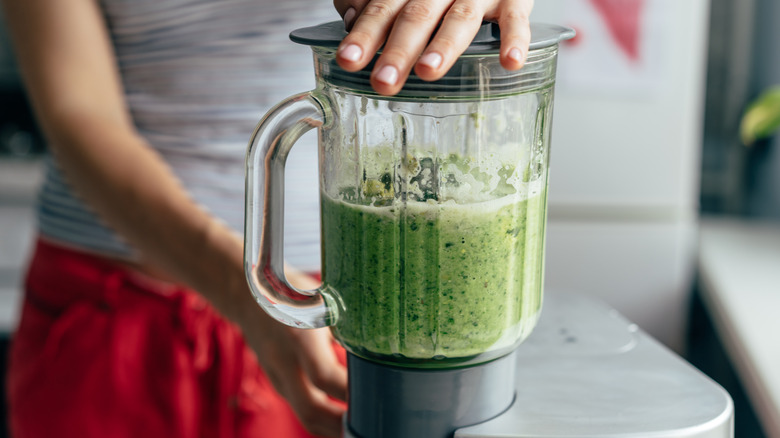What Are The Side Effects Of Taking Lactulose?
Talking about your bowel movements may feel awkward, but every person on the planet produces bodily waste and pooping is a completely normal part of the human experience. However, when your bowel becomes backed up, otherwise known as "constipation," the experience can range from slightly uncomfortable to extremely painful (via Johns Hopkins Medicine). From abdominal cramps to becoming bloated to having difficulty passing stool, constipation is the most frequent reason patients in the United States make appointments for gastrointestinal issues, with approximately 2.5 million medical appointments being made each year to treat constipation. One common way to treat constipation is through laxatives taken orally, such as lactulose.
Produced under the brand names Cholac, Generlac, Enulose, Constulose, and Constilac Syrup, lactulose is a laxative composed of synthetic sugar that is effective in treating constipation, according to MedlinePlus. Lactulose works by drawing water into the colon to make it easier for waste to be excreted. For patients with liver disease, lactulose can serve as a way to decrease ammonia levels in blood in a similar fashion by pulling ammonia present in the bloodstream into the gastrointestinal tract, specifically the colon, where it is then passed out of the body through the stool. Lactulose is taken orally in liquid form and is generally taken once daily, though each person's dosage is unique and you should follow your doctor's instructions for dosage and frequency. While lactulose is effective in producing stool that is easy to pass, there are side effects you should know about.
Frequent side effects of lactulose
While not quite a side effect, the first thing you may notice about lactulose is the bitter or foul taste it has. To overpower and subdue the taste of lactulose, you can mix the liquid medication with fruit juice or milk or dilute it by adding water to your dosage of lactulose (via WebMD). You can even try adding the liquid to a soft dessert, such as pudding, but be mindful of ensuring that the full amount of lactulose is sufficiently mixed in. Regardless of how you choose to consume the amount of lactulose prescribed to you, remember to take your daily dose at the same time each day for the best results and minimal side effects.
The National Health Service (NHS) reports that the most common side effect of lactulose is diarrhea, which affects more than 10% of people who take the medication. Since lactulose works to create softer poop that is easier to pass, sometimes the water that the medication pulls from the body into the colon to combat constipation can create a watery stool that might become diarrhea. Other frequently experienced side effects include increased passing of gas through burping and flatulence (colloquially called "farting" or "tooting"), abdominal pain, bloating, nausea, and vomiting. Serious side effects of lactulose that require immediate medical attention include signs of an allergic reaction to the medication, severe or intense vomiting or diarrhea that lasts for several days, sudden and significant weakness or muscle cramping, and irregular heartbeat.
How to counteract lactulose side effects
To mitigate the side effects of lactulose, water will be your best friend. The National Health Service (NHS) recommends drinking a lot of water and fluids with electrolytes to prevent dehydration, especially if you experience diarrhea, vomiting, or stomach upset from taking lactulose. Signs that you may be dehydrated include finding yourself going to the bathroom less frequently and experiencing urine that has a foul odor or is darker in color than usual. For women who take birth control pills and are also prescribed lactulose, make certain that you're aware that experiencing diarrhea as a lactulose side effect can potentially decrease the effectiveness of your contraceptive pills. Let your doctor know which birth control pill you take prior to starting a regimen of lactulose so that you can be knowledgeable about the ways in which lactulose may interrupt the ability of your birth control to prevent pregnancy.
After you begin taking lactulose, you may not have a bowel movement until up to 48 hours into taking the medication (per Mayo Clinic). During this time, even if your body isn't excreting stool, it is still extremely important that you drink a lot of fluids so that you can prevent dehydration before it happens. Continue to drink plenty of fluids for as long as you are taking lactulose. As the medication draws water into your colon, drinking fluids will help to replenish the water in your body that is being redirected to redress constipation or ammonia blood levels.



